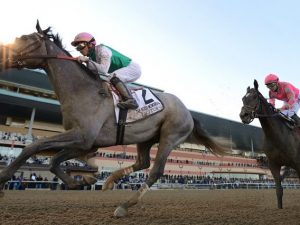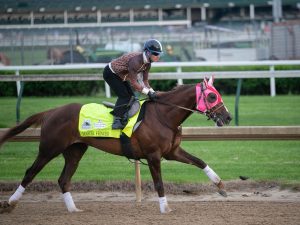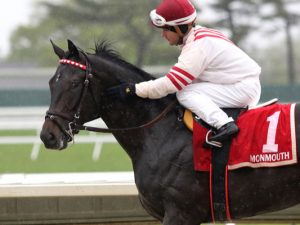by Guy Martin
Over the last six weeks, the Triple Crown Class of 2019 has been through so many shearing revolutions that it makes the former Derby favorites Omaha Beach, Improbable, and Roadster seem like they were racing in a previous century. Remember them? Since they, along with Maximum Security, will not be running on Saturday, the search for the required, elusive power quotient among those athletes who remain with us for this race will be all the more difficult. That the three-year-olds have, among themselves, had no overriding dominance established will serve to hone the questions about Saturday’s contestants.

Tacitus – Photo Courtesy of NYRA
Does morning line favorite Tacitus, by Tapit, really have the stuff for this mile-and-a-half? As a sire, Tapit is white hot, but he’s not known for his own distance credentials. In the Derby, Tacitus nobly brought enough of a run to claw into fourth and clambered onto the board into show post-race, promoted by Maximum Security’s shocking disqualification. He sat out the Preakness, trainer Bill Mott’s theory being that his dam-side pedigree (Close Hatches) indicates that he’s made for longer journeys. He’s breaking from the outside, or tenth, post position, so he should have a clean break and be able to settle. The trackside chatter is hot on him, and he is the morning line favorite at 9-5.
On the grittier side of the Triple Crown strategy, War of Will, famously fouled by Maximum Security in the Derby and the justly lauded winner of the Preakness, remains the only horse in Saturday’s field to have shown up for all three of these beloved big races. This is old-school Triple Crown racing that demands respect.
We’ll only really know how War of Will is handling the wear and tear of his campaign when the starter throws open the gate Saturday afternoon, but for now, his win at Pimlico was solid, and he’s the man. Or, at least the second-favorite with a debut in the morning line of 2-1. He’s breaking from the nine-hole, just inside his rival Tacitus, which should give him a great shot at a clean break. His post position is also good in the sense that, if the break and the early going allow both favorites to get comfortable, we could be treated to an excellent duel late in the race.
Belmont isn’t a speed-favoring track. It’s much admired and much feared by horsemen – admired because it is a challenge that makes any win there mean something extra, and feared because the sand quotient in its surface makes its big wide turns tough to get around. The track has a way of pulling and wearing horses, collapsing them down into themselves. Horsemen call the track ”The Big Sandy,” a nickname it’s earned quite honestly, which gives us a strong hint at the endurance required to run here.
Some Belmont winners have won wire-to-wire, as Justify did last year, with a splendid show of strength. In 1973, Secretariat traded the lead out of the gate but was up front, eventually winning by his history-making thirty-one lengths, the largest margin of victory in American thoroughbred racing. But his was the rare exercise of total power – forty-six years on, Secretariat’s winning time of 2:24 remains the track record and the American record for a mile-and-a-half on dirt.
For trainers, there’s a time-honored strategy of putting them in the Derby to get their feet wet, skipping the Preakness, and bringing them back to the Belmont to swipe the riches from the horses who have been taxed by their runs at the Preakness. It’s not always successful, but it’s a way of breaking up the ”bigness” and intensity of a Triple Crown run by bringing a quotient of racing normality to the athletes – in other words, from the horses’ perspective, the Derby and the Belmont are roughly a month apart. They become a bit more like any other two races at that focal length from each other. But just a bit. Higher up in the pecking order of this field, it’s exactly what Bill Mott is attempting to do with Tacitus.

Master Fencer
Master Fencer, breaking from the third post position, would be another example in Saturday’s race for that strategy. It’s not just that his connections had him sidestep the Preakness on May 18th and that he could be a fresher horse for it – it’s that he had a semi-decent Derby and has really been specifically aimed at Saturday’s race. He ran sixth in the Derby, admirably passing tired horses to get there but leaving himself too much to do. The question for him this weekend is whether he has the power to get his race run before Big Sandy’s gargantuan beastliness gets to him.
The Dale Romans-trained Everfast, who drew post position two and who carries a morning line of 12-1, is by no means lightly raced, but has only won once in his eleven starts. His sire is Take Charge Indy, which is to say, he’s got the distance in the pedigree, and he had an excellent Preakness, placing handily behind War of Will. He’s definitely threatening to hit the board on Saturday, the only rather large question for him is where he will hit it. It will take some stepping up for him to get in the mix with Tacitus.
Sir Winston and Spinoff are next to each other in the gate, at post positions seven and six, respectively, and aren’t far apart in the morning line, with Sir Winston at 12-1, and Spinoff at 15-1. To say the least, Spinoff, trained by Todd Pletcher, did not have a good Derby, placing eighteenth. Players who might like to back him are asked to forget that, chalking it up to the soggy track.
Pletcher’s Intrepid Heart, at post position eight with a morning line of 10-1, is a lightly-raced long shot, but he’s getting some buzz, first, because he’s out of Tapit, and second, because he stumbled, and had the presence of mind and focus to recover nicely to show in the Peter Pan. Similarly, Sir Winston, who beat Intrepid Heart in the Peter Pan, brought his run in that race from a distant eleven lengths back – from Pluto, basically – to take second place. At the moment, those performances are what makes these two athletes viable to players in shaping their trifectas.
Bourbon War enters race week with post position five and with a morning line assessment of 12-1. His terrible Preakness performance will be with him, or more precisely, his minor freak-out in the paddock and his subsequent running a lackluster eighth will be much on the players’ minds. Was it really the blinkers that so unhinged him that day? The debate has been heavy on whether that race should be counted in handicapping Bourbon War, or simply regarded as an off day. The race was three weeks back.
Although he did come unglued, it’s questionable as to whether Bourbon War, himself, remembers it. Certainly talented, he will face a Belmont that will definitely bring this field far greater challenges than this year’s Preakness could or did. Reportedly, the blinkers will be off on Saturday. Mike ”Big Money” Smith will be in the irons, so Bourbon War will have a very calm and collected Hall of Fame driver in his favor.
Tax, who drew the fourth post position on Tuesday evening, ran fourteenth in the Derby, which, if we are considering him, is a performance that we’d have to scratch. He’s had good races, including in the Wood Memorial, in which he was a game second to the Belmont favorite Tacitus. That performance and his distance pedigree are the reasons he’s here this weekend, but at the moment, he’s thought face an uphill scramble to hit the board. He’s at 15-1, just a step above Joevia, at 30-1 in the morning line.

Joevia – Photo Courtesy of Monmouth Park
Joevia, a Greg Sacco-trained colt who drew the rail, looks like the speed in this field. He’s certainly carrying the highest odds at the moment and looks to continue that as post time rolls toward us. The chatter in the Belmont barns is that, while there’s potential early in the race for him to box in or flummox one of the favorites, he’s expected to fade. It doesn’t seem that he’ll be much of a factor as the field turns for home, unless, of course, since it’s a horse race, something unforeseen happens and he’s there to mop it up.
Given the Derby’s wild start to 2019’s Triple Crown season, which gave us a 65-1 winner in Country House and which went a long way toward shaping this Belmont field, we’ll have to leave that possibility open.

Guy Martin began his writing career in military school in the South, where he and some of his dormmates started a mimeographed broadside called the “Trusty Tribunal.” During the same time period, he (accidentally) learned German, then studied in Berlin, which drove him to cover the fall of the Berlin Wall.
He still spends much of his time in Berlin and, in fact, is there now, working on a book for Alfred A. Knopf Publishers about the Cold War in East Berlin.
Guy has reported from London, Warsaw, Prague, Istanbul, Moscow, Hong Kong, Lima, Manila, Beirut, Tel Aviv, St. Moritz, Granada, Mindanao and from his native South for Esquire, Town and Country, Garden and Gun, Conde Nast Traveler, Men’s Journal, Departures, The New Yorker, and a host of other magazines in the United States and abroad.


